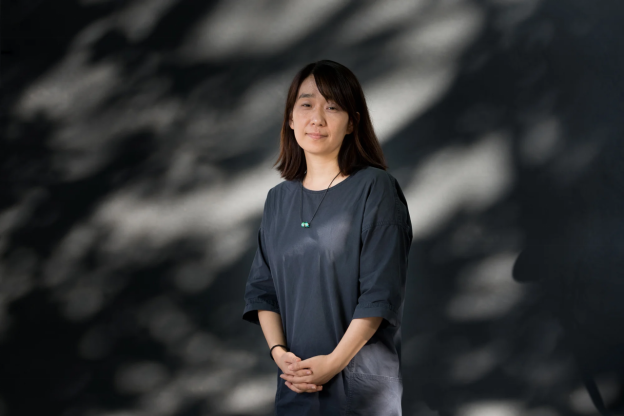
A New Era Marked by Han Kang’s Nobel Prize Win
TANZEELA JAFFAR
Not only is Han Kang the first South Korean writer to receive the Nobel Prize in Literature, but the field of South Korean literature as a whole is seeing a historic moment with her acknowledgment. This accomplishment draws attention to a literary heritage that has been receiving praise from readers all across the world and highlights the deep stories and avant-garde writing that characterize modern Korean authors. This article examines the surge in popularity of South Korean literature and features five internationally recognized writers whose works have transcended boundaries and captured the attention of readers all across the world.
The Significance of Han Kang’s Nobel Prize:
Han Kang received the Nobel Prize in Literature on October 10, 2024, a distinguished honor that highlights both her literary accomplishments and South Korea’s cultural relevance on the international literary landscape. Her “intense poetic prose that confronts historical trauma and exposes the fragility of human life” was lauded by the Swedish Academy. This honor is especially significant because it highlights how writing can speak to readers from all backgrounds and address both societal concerns and personal challenges.
Poetry was Han Kang’s first literary medium, and it had a big impact on her prose. Drawing inspiration from historical occurrences like as the Gwangju Uprising, her paintings frequently delve into issues of violence, identity, and the human condition. Her works of fiction, such as The Vegetarian and Human Acts, have been translated into other languages and have received critical praise, making her voice more widely known.
Literary Accomplishments:
Han Kang’s literary works are distinguished by their poetic language and in-depth examination of significant subjects including trauma, identity, and the human predicament. Among her most renowned creations are:
The Vegetarian (2007 )
The protagonist of this book is a lady named Yeong-hye, who resolves to give up meat after having a scary dream. Her choice has far-reaching effects on both her family and herself. The book looks with individual disobedience, society expectations, and the psychological effects of trauma. It propelled Kang into international prominence in 2016 when it was awarded the International Booker Prize.
Human Acts (2014)
This terrifying account explores the circumstances underlying the 1980 Gwangju Uprising, a violent and oppressive turning point in South Korean history. Kang examines issues of pain, grief, and resiliency from a variety of angles. Readers all across the world are drawn to the book because of its historical relevance and emotional depth.
The White Book (2016):
This work examines loss and remembrance through the prism of color symbolism. It is a meditation on life and death conveyed via a series of introspective essays. The contemplative tone of the book demonstrates Kang’s skill at fusing beautiful language with deep philosophical questions.
Influence on Literary Works:
Because of Han Kang’s ability to write across cultural divides, readers from a variety of backgrounds may relate to her topics. Her examination of human frailty and historical pain has established her as a major figure in modern writing. Her unique accomplishments are acknowledged by the Nobel Prize, which also raises the profile of South Korean literature internationally.
South Korean Literature’s Ascension:
In recent years, South Korean literature has undergone a rebirth, garnering acclaim on a global scale thanks to a number of writers who have challenged convention and tackled difficult subjects. There are several reasons for this increase:
Cultural Context:
Korea’s turbulent past, which included colonization, conflict, and tyranny, has influenced the country’s literary scene. These historical traumas frequently cause writers to suffer, leading them to create novels that mirror both personal experiences and societal difficulties.
Globalization:
K-pop and Korean films have spurred a growing interest in Korean culture, which has made it easier for literary works to be seen internationally. These stories are now widely available to readers throughout the world thanks in large part to translations.
Creative Storytelling:
Modern South Korean writers are renowned for their avant-garde writing styles and openness to investigating unusual subjects. This novel approach has drawn many people who are looking for new literary viewpoints.
Cho Nam-joo: Challenging Gender Norms:
Literary Achievements:
● Kim Jiyoung, Born 1982 (2016)
Cho Nam-joo’s debut novel, Kim Jiyoung, Born 1982 (2016), established her as a prominent literary voice in South Korea.
This revolutionary work recounts the life of Kim Jiyoung, an average lady who represents the challenges that many Korean women experience in a patriarchal culture. The story explores gender disparity via Jiyoung’s experiences as she navigates social expectations and personal goals. It has sold over a million copies and been translated into other languages, sparking extensive discussion about feminism in Korea.
● The Last Woman (2020)
In this thought-provoking novel, Cho explores themes of motherhood and societal pressures through the lens of a woman’s life journey. The narrative challenges traditional notions of femininity while highlighting the complexities faced by women in contemporary society.
● Tangerine Green (2020)
This coming-of-age story focuses on four friends navigating adolescence while grappling with their own insecurities and familial pressures. Cho’s ability to capture nuanced emotions resonates with young adult readers.
Influence on Literary world:
The literary world of South Korea has witnessed the significant amplification of female voices thanks to the works of Cho Nam-joo. Through her direct discussion of gender problems, she challenges readers to question social standards and push for reform. A new generation of writers has been motivated to tackle related issues in their writing by her popularity.
Other Prominent Writers from South Korea:
1. Han Kang:
Notable Works: The Vegetarian, Human Acts, Greek Lessons
The secret of Han Kang’s creative genius is her ability to combine rich emotional depth with beautiful language. In her book The Vegetarian, Yeong-hye, a lady who has unsettling nightmares, makes the decision to give up meat. The ramifications of this choice upend her family’s relationships and society expectations. The book examines themes of trauma and resistance while questioning accepted ideas of identity and autonomy.
In Human Acts, Kang uses interwoven stories that give voice to victims of violence to address the horrific reality of the Gwangju Uprising. The novel is a potent commentary on historical trauma because of its beautiful style, which conveys both the horror and humanity present in moments of despair.
2. Kim Young-ha:
Notable Works: I Have the Right to Destroy Myself, Your Republic Is Calling You, The Emissary
Kim Young-ha is renowned for his investigations of alienation, identity, and the intricacies of contemporary South Korean society. I Have the Right to Destroy Myself, his debut book, explores existentialist and self-destruction topics from the eyes of an anonymous narrator who helps people commit suicide.
Kim explores the life of a North Korean spy operating clandestinely in South Korea in Your Republic Is Calling You. This book interrogates national boundaries and interpersonal relationships while highlighting difficulties related to identity and loyalty.
3. Hwang Sok-Yong:
Notable Works: The Guest, Familiar Things, Princess Bari
One of Korea’s most well-known writers, Hwang Sok-yong is renowned for his dedication to historical awareness and social justice. In his book The Guest, a young man who has fought in Vietnam returns home to examine the effects of war on both people and society.
Hwang tackles environmental concerns in Familiar Things by showing a village that is being uprooted by industrial growth. His art frequently highlights human endurance in the face of hardship while reflecting on Korea’s sociopolitical environment.
4. Bae Suah:
Notable Works: Nowhere to Be Found, The Essayist, Recitation
Bae Suah is well-known for her reflective stories that frequently straddle the boundaries of fact and fiction. She examines issues of dislocation and loneliness in Nowhere to Be Found by telling the tale of a lady adjusting to life in a foreign city.
Her writing is distinguished by its philosophical overtones and poetic nature, which encourage readers to consider memory and identity while thinking back on their own experiences.
5. Bora Chung:
Notable Works: Cursed Bunny, The Last Train Home
Cursed Bunny, a collection of short stories by Bora Chung, has won praise from readers all over the world for its creative storytelling and examination of dark subjects including trauma, violence, and social conventions. In Chung’s stories, fantasy and realism frequently coexist to create bizarre worlds that defy readers’ expectations.
Her work tackles bigger topics of power relations and cultural expectations while reflecting on current difficulties encountered by women in society.
Breaking Barriers: The Impact on Global Literature:
The emergence of South Korean literature is a celebration of its writers as well as an acknowledgment of the shared cultural background that influences their stories. These authors advance our knowledge of the variety of voices found in world literature as they become more well-known on a worldwide scale.
Dispelling Myths:
The popularity of writers such as Han Kang dispels the myth that Asian literature is homogenous or limited to conventional subjects. Rather, these authors depict intricate individuals who navigate many realities influenced by historical settings.
Promoting Cultural interchange:
Readers throughout the world are exposed to distinct viewpoints that promote cultural interchange as translations proliferate. By appreciating ethnic diversity and bringing attention to common human experiences, this exposure enhances literary conversation.
Empowering Voices:
In literary groups that have historically been dominated by male voices, the acceptance of female authors such as Han Kang represents a change toward inclusion. More women authors are inspired to express their experiences and viewpoints as a result of this empowerment.
Conclusion:
The Nobel Prize victory of Han Kang is a noteworthy turning point in South Korean literature, highlighting both its rich history and modern advancements. South Korean literature has gained international recognition via the work of this and other notable writers by embracing inventive storytelling approaches and delving into intricate historical subjects.
Readers are drawn into worlds that subvert expectations, spark thinking, and elicit strong emotional reactions as they continue to explore these stories. South Korean literature appears to have a bright future as it continues to shatter stereotypes and influence authors throughout the globe.
As we celebrate this literary renaissance, we honor not just the accomplishments of individual writers but also the storytelling medium’s collective strength, which has the ability to bridge cultural divides and create understanding.
Wrtier can be reached at [email protected]







